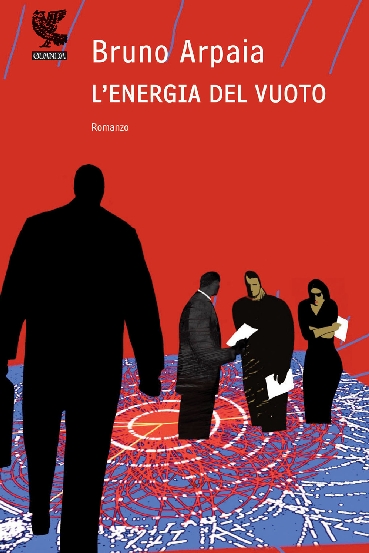Bruno promised to send me a copy of the book as soon as it came out of the press, and so he did. I am holding in my hands the book, which has a quite nice artwork on the front cover (I do like it a lot). In a few days I blitzed through the 250 pages of the novel, originally with the sole intent of paying back Arpaia's courtesy with a review in my blog, but then with increased curiosity for the plot and for the particular way the novel is constructed. Let me explain.
 The main setting of the action is at CERN, during the first year or so of running by the LHC. There is expectation for the new data, which might provide confirmation to many theorists' hopes and glory to the experimenters. But the characters we are gradually introduced with are complex figures, and their personal stories provide the main level of the narration. A family divided by the cannibalizing needs of the experiment, a stunning Spanish female journalist who tries to learn physics from the mouth of physicists and gets entangled with both, an obscure group of arab fundamentalists who try to ruin the science, secret service agents. On the background, a somewhat disturbing socio-political situation, climate change, and terrorist attacks.
The main setting of the action is at CERN, during the first year or so of running by the LHC. There is expectation for the new data, which might provide confirmation to many theorists' hopes and glory to the experimenters. But the characters we are gradually introduced with are complex figures, and their personal stories provide the main level of the narration. A family divided by the cannibalizing needs of the experiment, a stunning Spanish female journalist who tries to learn physics from the mouth of physicists and gets entangled with both, an obscure group of arab fundamentalists who try to ruin the science, secret service agents. On the background, a somewhat disturbing socio-political situation, climate change, and terrorist attacks.Although the largest part of my readers here do not have a chance of reading the book -at least until it gets translated to English-, I prefer to avoid spoiling the novel by discussing the plot in more detail. So let me instead focus on a couple of details. Two gambles that the author is not afraid of taking.
The first is that Arpaia put a hell of a lot of physics in the book. No formulas, of course (a well-known equation, which however I cannot write here lest I instantly lose half of my readers, dictates that the number of copies a book may sell decreases by a factor of two for every mathematical formula it contains), but in some points the book is challenging to read; not for the complexity of the concepts, most of which the reader learns as the Spanish journalist hears them from the physicists who help her figure out the science of the LHC, but rather for the fact that they somewhat affect the rhythm of the narration.
The author is quite good at conveying the awe for some of the deepest mysteries of physics and cosmology, and the science is remarkably correct despite the obvious simplifications, but still I think that some potential readers might be turned off by the information density of the novel. I take it that Arpaia put it as a challenge to himself: write a novel and at the same time get the reader acquainted with cutting-edge science. It is indeed a courageous attempt, and I wish him well for the sales!
The other challenge implicit in the way the book is constructed is the one of taking the normal development of facts and the story of the protagonists, and scrambling their order. If you think that flashbacks are confusing, this book is not for you: in Arpaia's novel you start by reading a two-three page bit describing an escape through the French country, and only 200 pages after will you get to know what triggered the escape. Events do not flow in a time-ordered fashion, because there is no such thing: time, the authors suggests, does not really flow in the universe, but we perceive it as flowing because we have the natural tendency of putting in order the facts we witness along a sequence of cause-effect. So the underlying bet of the author is that by reading five, ten different stories intertwined with each other, but scrambled in random order, you will still be able to understand the whole plot at the end. It works, if you are willing to play.





Comments